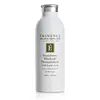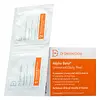What's inside
What's inside
 Key Ingredients
Key Ingredients

 Benefits
Benefits

 Concerns
Concerns

 Ingredients Side-by-side
Ingredients Side-by-side

Oryza Sativa Starch
AbsorbentCicer Arietinum Seed Powder
AbrasiveVolcanic Ash
AbrasiveSodium Cocoyl Isethionate
CleansingAvena Sativa Starch
AbsorbentColloidal Oatmeal
AbsorbentAvena Sativa Meal Extract
SoothingTitanium Dioxide
Cosmetic ColorantSalicylic Acid
MaskingPapain
Skin ConditioningHydrolyzed Walnut Extract
AntioxidantMedicago Sativa Extract
TonicEquisetum Arvense Extract
AstringentCitrus Grandis Seed Extract
AstringentCamellia Sinensis Leaf Extract
AntimicrobialFragaria Ananassa Fruit Extract
Skin ConditioningHydrolyzed Strawberry Fruit
AstringentHydrolyzed Rheum Officinale Root Extract
Skin ProtectingSalix Alba Bark Extract
AstringentVitis Vinifera Leaf Oil
MaskingSilica
AbrasiveLactic Acid
BufferingGlycyrrhiza Glabra Root Extract
BleachingMoroccan Lava Clay
AbrasivePotato Starch Modified
Retinol
Skin ConditioningCalcium Ascorbate
AntioxidantTocopherol
AntioxidantUbiquinone
AntioxidantThioctic Acid
AntioxidantArctium Lappa Root Extract
Skin ConditioningGinkgo Biloba Leaf Extract
Skin ConditioningOryza Sativa Starch, Cicer Arietinum Seed Powder, Volcanic Ash, Sodium Cocoyl Isethionate, Avena Sativa Starch, Colloidal Oatmeal, Avena Sativa Meal Extract, Titanium Dioxide, Salicylic Acid, Papain, Hydrolyzed Walnut Extract, Medicago Sativa Extract, Equisetum Arvense Extract, Citrus Grandis Seed Extract, Camellia Sinensis Leaf Extract, Fragaria Ananassa Fruit Extract, Hydrolyzed Strawberry Fruit, Hydrolyzed Rheum Officinale Root Extract, Salix Alba Bark Extract, Vitis Vinifera Leaf Oil, Silica, Lactic Acid, Glycyrrhiza Glabra Root Extract, Moroccan Lava Clay, Potato Starch Modified, Retinol, Calcium Ascorbate, Tocopherol, Ubiquinone, Thioctic Acid, Arctium Lappa Root Extract, Ginkgo Biloba Leaf Extract
Water
Skin ConditioningAlcohol Denat.
AntimicrobialGlycolic Acid
BufferingPotassium Hydroxide
BufferingHamamelis Virginiana Water
AstringentSalicylic Acid
MaskingPolysorbate 20
EmulsifyingCitric Acid
BufferingLactic Acid
BufferingMalic Acid
BufferingCamellia Sinensis Leaf Extract
AntimicrobialAchillea Millefolium Extract
CleansingAnthemis Nobilis Flower Extract
MaskingSoy Isoflavones
Skin ConditioningCopper PCA
HumectantZinc PCA
HumectantLecithin
EmollientDisodium EDTA
Alcohol
AntimicrobialPolysorbate 80
EmulsifyingParfum
MaskingLinalool
PerfumingBenzyl Salicylate
PerfumingBenzoic Acid
MaskingPhenoxyethanol
PreservativeSodium Benzoate
MaskingSodium Bicarbonate
AbrasiveAscorbic Acid
AntioxidantAscorbyl Palmitate
AntioxidantRetinyl Palmitate
Skin ConditioningRetinol
Skin ConditioningTocopheryl Acetate
AntioxidantResveratrol
AntioxidantUbiquinone
AntioxidantLeuconostoc/Radish Root Ferment Filtrate
AntimicrobialPhospholipids
Skin ConditioningSodium PCA
HumectantDimethicone
EmollientPEG-30 Stearate
EmulsifyingOctoxynol-9
EmulsifyingBHT
AntioxidantTetrasodium EDTA
Sorbic Acid
PreservativeWater, Alcohol Denat., Glycolic Acid, Potassium Hydroxide, Hamamelis Virginiana Water, Salicylic Acid, Polysorbate 20, Citric Acid, Lactic Acid, Malic Acid, Camellia Sinensis Leaf Extract, Achillea Millefolium Extract, Anthemis Nobilis Flower Extract, Soy Isoflavones, Copper PCA, Zinc PCA, Lecithin, Disodium EDTA, Alcohol, Polysorbate 80, Parfum, Linalool, Benzyl Salicylate, Benzoic Acid, Phenoxyethanol, Sodium Benzoate, Sodium Bicarbonate, Ascorbic Acid, Ascorbyl Palmitate, Retinyl Palmitate, Retinol, Tocopheryl Acetate, Resveratrol, Ubiquinone, Leuconostoc/Radish Root Ferment Filtrate, Phospholipids, Sodium PCA, Dimethicone, PEG-30 Stearate, Octoxynol-9, BHT, Tetrasodium EDTA, Sorbic Acid
 Reviews
Reviews

Alternatives
Ingredients Explained
These ingredients are found in both products.
Ingredients higher up in an ingredient list are typically present in a larger amount.
Camellia Sinensis Leaf Extract is derived from the leaves of the tea plant. Black tea, green tea, and oolong tea are all harvested from this plant.
This ingredient has many skin benefits:
This ingredient contains polyphenols, a strong antioxidant. Antioxidants help fight off molecules that damage skin cells.
On top of that, the antioxidants in green tea neutralize free-radicals from the sun. This gives the skin some extra UV protection, but should not replace sunscreen.
Many components of tea have anti-inflammatory properties.
Polyphenols and L-theanine help soothe the skin and reduce irritation. The caffeine in Camellia Sinensis Leaf Extract helps calm inflamed blood vessels.
Other compounds found in tea include: Vitamin Bs, linoleic acid, magnesium, calcium, iron, and zinc.
Research has shown both drinking Camellia Sinensis Leaf Tea and applying it to the skin can help boost skin elasticity and hydration. Studies also show using tea extract may reduce sebum, or oil, production.
Learn more about Camellia Sinensis Leaf ExtractLactic Acid is another well-loved alpha hydroxy acid (AHA). It is gentler than glycolic acid but still highly effective.
Its main role is to exfoliate the surface of the skin by loosening the “glue” that holds dead skin cells together. Shedding those old cells leads to smoother, softer, and more even-toned skin.
Because lactic acid molecules are larger than glycolic acid, they don’t penetrate as deeply. This means they’re less likely to sting or irritate, making it a great choice for beginners or those with sensitive skin.
Like glycolic acid, it can:
Lactic acid also acts as a humectant (like hyaluronic acid). It can draw water into the skin to improve hydration and also plays a role in the skin's natural moisturizing factor (NMF) in the form of sodium lactate.
Studies show it can boost ceramide production to strengthen the skin barrier and even help balance the skin’s microbiome.
To get results, choose products with a pH between 3-4.
Lower strengths (5-12%) focus on surface exfoliation; higher strengths (12% and up) can reach deeper in the dermis (deeper, supportive layer) to improve skin texture and firmness over time.
Though it was originally derived from milk, most modern lactic acid used in skincare is vegan. It is made through non-dairy fermentation to create a bio-identical and stable form suitable for all formulations.
When lactic acid shows up near the end of an ingredient list, it usually means the brand added just a tiny amount to adjust the product’s pH.
Legend has it that Cleopatra used to bathe in sour milk to help reduce wrinkles.
Lactic acid is truly a gentle multitasker: it exfoliates, hydrates, strengthens, and brightens. It's a great ingredient for giving your skin a smooth, glowing, and healthy look without the harshness of stronger acids.
Read more about some other popular AHA's here:
Learn more about Lactic AcidRetinol is a gold-standard ingredient for anti-aging. It is a form of Vitamin A and belongs to the class of retinoids that also includes tretinoin.
Why is retinol famous?
It has the most scientific studies backing up its skin benefits out of all the non-prescription ingredients.
Retinol is proven to:
This is why retinol is effective at removing wrinkles, fading dark spots, treating acne, and reducing the appearance of pores.
Studies show retinol is less effective when exposed to UV. Be sure to look for appropriate packaging to keep your retinol potent (similar to Vitamin C).
Using retinol or any retinoids will increase sun-sensitivity in the first few months. Though studies show retinoids increase your skin's natural SPF with continuous use, it is best to always wear sunscreen and sun-protection.
We recommend speaking with a medical professional about using this ingredient during pregnancy.
Retinol may cause irritation in some people, so be sure to patch test. Experts recommend 'ramping up' retinol use: start using this ingredient once a week and work up to using it daily.
Read about Tretinoin
Learn more about RetinolSalicylic Acid (also known as beta hydroxy acid or BHA) is a well-known ingredient for treating skin that struggles with acne and clogged pores. It exfoliates both the skin's surface and deep within the pores to help clear out buildup, control oil, and reduce inflammation.
Unlike AHAs (alpha hydroxy acids), salicylic acid is oil-soluble. This allows it to penetrate into pores which makes it especially effective for treating blackheads and preventing future breakouts.
Salicylic acid is also known for its soothing properties. It has a similar structure to aspirin and can calm inflamed or irritated skin, making it a good option for acne-prone skin that is also sensitive.
Concentrations of 0.5-2% are recognized by the U.S. FDA as an over-the-counter topical acne product.
It can cause irritation and/or dryness if one's skin already has a compromised moisture barrier, so it's best to focus on repairing that before introducing this ingredient into your routine.
While salicylic acid does not increase sun sensitivity, it’s still important to wear sunscreen daily to protect your skin.
If you are looking for the ingredient called BHA or Butylated Hydroxyanisole, click here.
Learn more about Salicylic AcidUbiquinone (Coenzyme Q10) is a molecule already found in our bodies. It is a potent antioxidant and skin-soothing ingredient.
Aging and environmental exposure diminishes our skin's natural ubiquinone levels. This is much like our natural collagen and elastin.
The good news is: studies show applying this ingredient topically replenishes ubiquinone levels in our skin. This also comes with a ton of skin benefits. These benefits include:
Ubiquinone is considered a large molecule and cannot be absorbed into the lower layers of skin. This is why it is believed to be such an effective antioxidant: it protects our skin in the upper layers and prevents damage in the deeper layers.
When used in sunscreen, ubiquinone is shown to increase ingredient stability, increase SPF factor, and add to infrared protection.
Fun fact: ubiquinone is fat-soluble.
Learn more about Ubiquinone